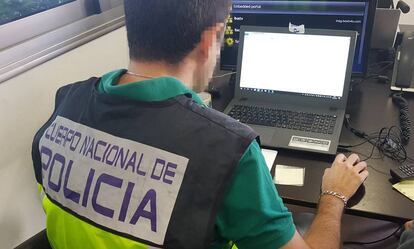Spanish police bust Europe’s largest illegal TV streaming service
Five people have been arrested – including three in Málaga – for providing pirated IPTV in a criminal operation estimated to have made €8 million in profits since 2013

Spanish police have arrested five members of a criminal organization accused of illegally selling access to pay-TV over the internet. Police believe the raid against the international organization, which is based in Spain and has branches in Denmark, the United Kingdom, Latvia, the Netherlands and Cyprus, is the largest European operation against an illegal TV streaming business.
Subscribers payed between €40 and €460 a month and had access to more than 800 international channels
Three of the members arrested lived in luxury housing developments in Spain’s southern region of Costa del Sol and owned several high-range cars. The profits of the illegal operation allowed members to live the high life – police estimate the group made €8 million since 2013.
Thousands of people from 30 different countries paid between €40 and €460 a month to watch their favorite soccer games, TV shows and movies. What they did not know was that they were doing so via a pirate operator.
Police were alerted to the organization in 2015 after Premier League, England’s first division soccer league, filed a complaint stating that a web-based service in Málaga in Costa del Sol was offering Internet Protocol television (IPTV) subscriptions – a service that distributes pay-TV online – without authorization. When police began to investigate, they quickly became aware of the scale of the operation: users of the website had access to more than 800 international television channels, a catalogue of protected audiovisual work, and a wide range of radio stations from across the world. The organization had a score of web pages offering the same services.
To access the content, subscribers paid between €40 and €460 a month depending on the package chosen, their country of origin and the number of the months they had signed up for. The monthly fees were made to a company in Gibraltar, the British Overseas Territory located in the south of Spain.
Three of the members arrested lived in luxury housing developments in Costa del Sol
To maintain the appearance of legality, the organization created telecommunication, internet and hardware companies. They became authorized fiber optic operators, which made clients trust that they also had the license to distribute foreign channels. By mixing the incomes from both activities, the organization managed to avoid police detection. While the main operations were based in Spain, they had business partners in Denmark who provided them with technical support and access to even more channels.
The Spanish police led a joint investigation with Denmark and the United Kingdom in which 14 other branches were found: eight in Spain (in Málaga, Madrid and Alicante), four in Denmark and two in the United Kingdom. As a result of the investigation, 66 servers were disconnected and the rest, which were part of a network of internationally connected computers, were detected and identified.
The five people arrested have had their bank accounts frozen and have been accused of several crimes including breaking intellectual property law, belonging to a criminal organization and money laundering. The three arrested in Spain have already faced trial and are currently in prison. Another 10 people have given statements as witnesses.
English version by Asia London Palomba.
Tu suscripción se está usando en otro dispositivo
¿Quieres añadir otro usuario a tu suscripción?
Si continúas leyendo en este dispositivo, no se podrá leer en el otro.
FlechaTu suscripción se está usando en otro dispositivo y solo puedes acceder a EL PAÍS desde un dispositivo a la vez.
Si quieres compartir tu cuenta, cambia tu suscripción a la modalidad Premium, así podrás añadir otro usuario. Cada uno accederá con su propia cuenta de email, lo que os permitirá personalizar vuestra experiencia en EL PAÍS.
¿Tienes una suscripción de empresa? Accede aquí para contratar más cuentas.
En el caso de no saber quién está usando tu cuenta, te recomendamos cambiar tu contraseña aquí.
Si decides continuar compartiendo tu cuenta, este mensaje se mostrará en tu dispositivo y en el de la otra persona que está usando tu cuenta de forma indefinida, afectando a tu experiencia de lectura. Puedes consultar aquí los términos y condiciones de la suscripción digital.









































